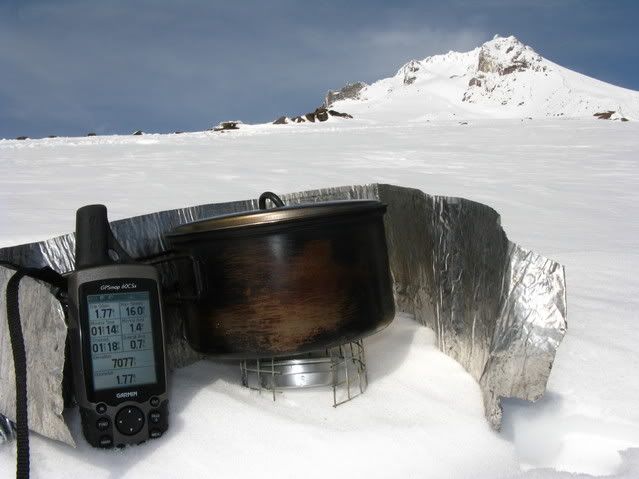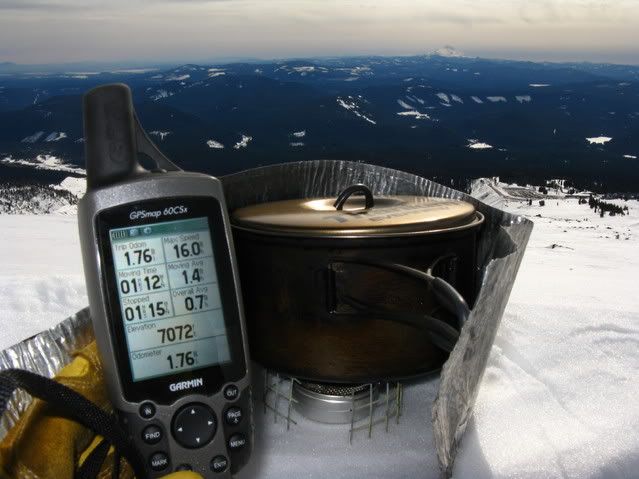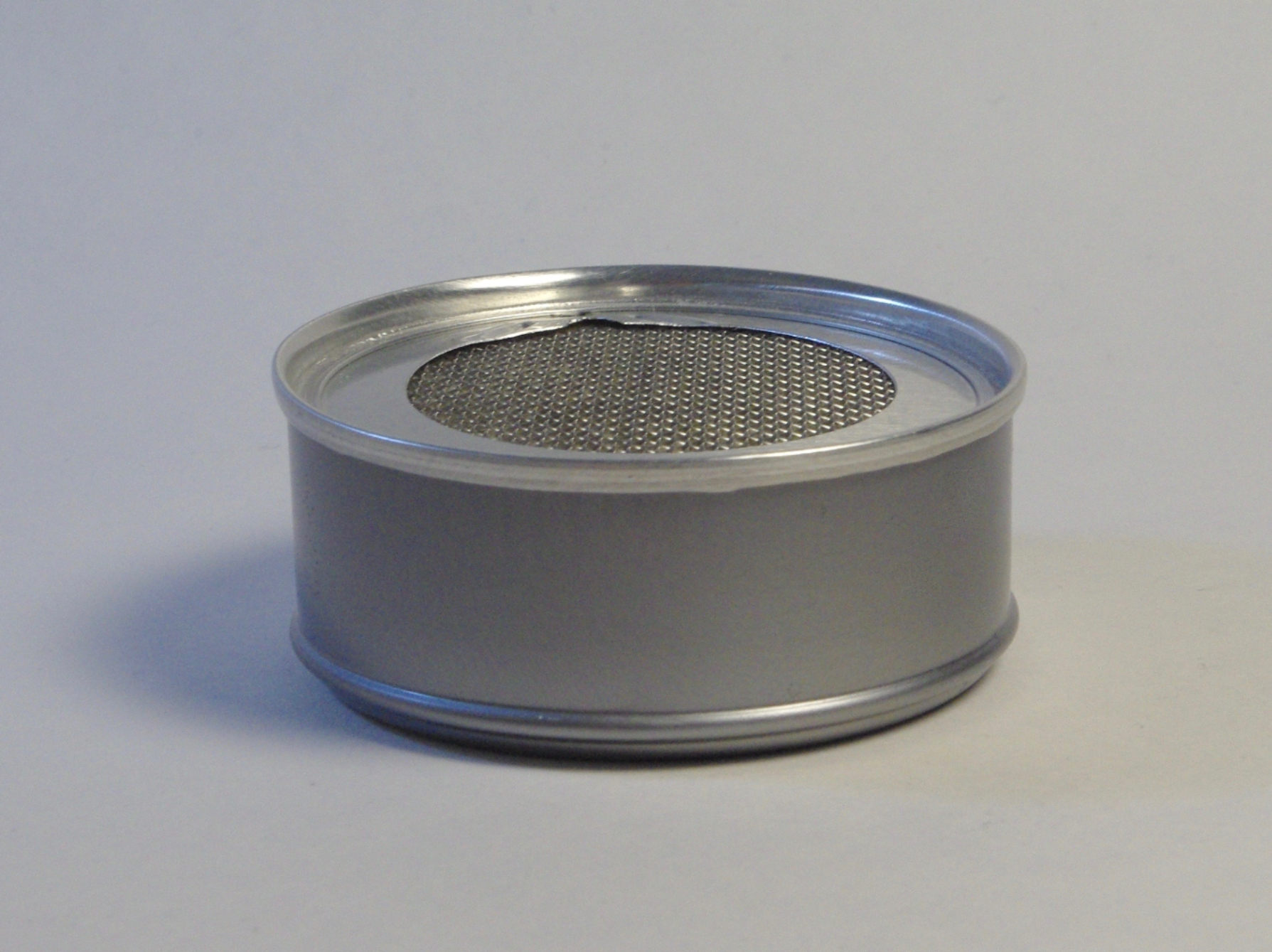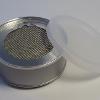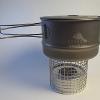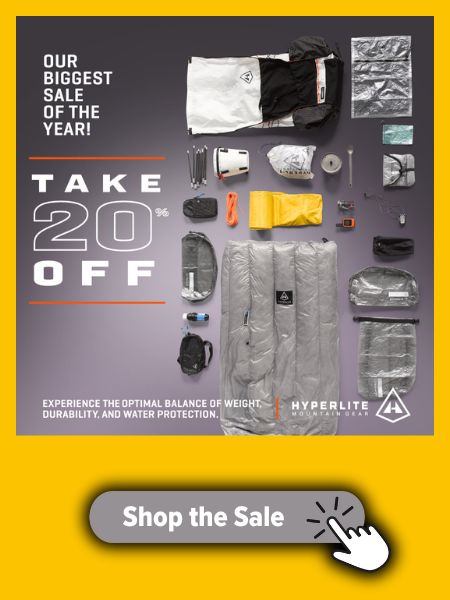Topic
Alcohol Stove Comparison: Trail Designs (12-10 and Kojin) vs. Zelph (Starlyte and Starlyte Mod)
Forum Posting
A Membership is required to post in the forums. Login or become a member to post in the member forums!
Home › Forums › Campfire › Editor’s Roundtable › Alcohol Stove Comparison: Trail Designs (12-10 and Kojin) vs. Zelph (Starlyte and Starlyte Mod)
- This topic has 43 replies, 18 voices, and was last updated 6 years, 6 months ago by
 DAN-Y.
DAN-Y.
-
AuthorPosts
-
May 6, 2018 at 11:45 pm #3534066
On a recent campout with the Scouts, I boiled water for three meals and had much faster boil times and lower fuel consumption.
I measured wind at 5.5mph and came to a conclusion. Anyone who tries to cook in this without using some kind of windbreak (I used my backpack on its side) probably deserves to wait extra long for their meal.
Even though the Cone is designed to act as a windbreak, I like to think of it as a seatbelt. It’s nice to have just in case but two car lengths of distance are even better!
May 7, 2018 at 12:12 pm #3534123Michael Ray: I’m aware of the prohibited use of alcohol stoves during BSA activities but have made several “homebrew” stoves with them so that they have an inexpensive and easy to use stoves on their own outings.
I did use this setup with the Starlyte to boil water for three scouts who forgot to bring dinner at our last campout.
The way you worded that sounds like this was an official BSA activity. It makes no difference whether you use it or a Scout does. Or this was one of those non-BSA campouts that happened to include mostly Scouts?
May 7, 2018 at 12:29 pm #3534125During my BSA scoutmaster training they spoke about the ban on alcohol stoves for scouts. I asked if it was ok for adult leaders to use them and my council trainers responded that it’s fine for adults to use them and even thought it would be useful to demonstrate them to scouts so they were aware of their use.
I was using a Zelph Fancee Feest stove at that point and asked them about the DIY aspect. They both thought it was fine because it was made by someone who had somebody lots of r&d. I think the detail that pushed them over the edge was that I mentioned the inner steel piece had been spot welded. In truth, I think a Toaks or Vargo stove stove would meet the non-diy stipulation better. That’s not a dig on Dan but even his site says something to the effect of “we diy it so you don’t have to.”
May 7, 2018 at 8:01 pm #3534186May 6, 2018 at 11:38 pm/David Hosmer
I’d be interested in seeing any results of your further testing! I did use this setup with the Starlyte to boil water for three scouts who forgot to bring dinner at our last campout. The ambient temperature was around 65F (much warmer than the testing). I boiled 2 cups of water for two kids sharing a Mountain House and set a 9-minute timer so that they would know when the rehydrating was done. I had 2 cups boiling for the next boy’s potatoes before my timer went off. After all that, I still had enough fuel to start my dinner but had to add fuel after about 5 minutes.(May 6, 2018 at 11:45 pm/David Hosmer)
On a recent campout with the Scouts, I boiled water for three meals and had much faster boil times and lower fuel consumption.I measured wind at 5.5mph and came to a conclusion. Anyone who tries to cook in this without using some kind of windbreak (I used my backpack on its side) probably deserves to wait extra long for their meal.
Even though the Cone is designed to act as a windbreak, I like to think of it as a seatbelt. It’s nice to have just in case but two car lengths of distance are even better!
David, it’s interesting that you chose the Starlyte to use while on the camp-out with the scouts. What do you attribute to the faster boil times and less fuel consumption?
Was it Trail Designs or Backpackinglight that asked you to do the comparisons of stoves/burners?
May 7, 2018 at 9:41 pm #3534202@ Mike K
BSA policy does not ban alcohol stoves. The chemical fuel policy prohibits stoves that are mot commercially manufactured AND liquid alcohol fuel is not recommended. So I take that to mean homemade stoves are banned but commercially made alcohol stoves are approved but not recommended. The my own Zelph Starlyte looks commercially manufactured to me. So does the Kojin. I might have a hard time convincing a liability lawyer that the TD 12-10 was commercially manufactured. I I think it would be a bad idea to allow younger Scouts to alcohol stoves. But if older, experienced Scouts have been trained on the use of Trango, Starlyte or Kojin stoves and they are allowed by land management agency, I see no reason to avoid them.
in reference to showing the Scouts how they work. I think it would be OK during a Troop meeting to do a demonstration. But on outings, the leaders should comply with the BSA safety policy. Otherwise we are telling our Scouts is OK to disregard rules whenever they feel like it.
As a final note, and a topic not talked about much, but it is my layperson’s understanding that when Troops or adult leaders go outside the pale of BSA safety policy, they also risk putting themselves outside the coverage of any volunteer liability insurance policy in effect by the Troop, local Council, or National.
Cheers
May 9, 2018 at 2:15 am #3534438May 6, 2018 at 11:38 pm/David Hosmer
I’d be interested in seeing any results of your further testing! I did use this setup with the Starlyte to boil water for three scouts who forgot to bring dinner at our last campout. The ambient temperature was around 65F (much warmer than the testing). I boiled 2 cups of water for two kids sharing a Mountain House and set a 9-minute timer so that they would know when the rehydrating was done. I had 2 cups boiling for the next boy’s potatoes before my timer went off. After all that, I still had enough fuel to start my dinner but had to add fuel after about 5 minutes.(May 6, 2018 at 11:45 pm/David Hosmer)
On a recent campout with the Scouts, I boiled water for three meals and had much faster boil times and lower fuel consumption.I measured wind at 5.5mph and came to a conclusion. Anyone who tries to cook in this without using some kind of windbreak (I used my backpack on its side) probably deserves to wait extra long for their meal.
Even though the Cone is designed to act as a windbreak, I like to think of it as a seatbelt. It’s nice to have just in case but two car lengths of distance are even better!
David, it’s interesting that you chose the Starlyte to use while on the camp-out with the scouts. What do you attribute to the faster boil times and less fuel consumption?
Was it Trail Designs or Backpackinglight that asked you to do the comparisons of stoves/burners?
May 10, 2018 at 1:11 am #3534604David H, why did you include the 12-10 in your comparisons of 2 wick style stoves/burners?
May 11, 2018 at 2:35 am #3534763David, where are you, need your assistance. Inquiring minds want to know
 May 12, 2018 at 5:09 am #3535003
May 12, 2018 at 5:09 am #3535003Sorry Dan Y, I don’t get on the computer much throughout the week.
I chose the Starlyte stove because I like the way the lid fits on a little bit better than the Kojin. It also performed better during the testing (if only slightly).
Without a doubt, I attribute that faster boil times and lower fuel consumption to the ambient temperature and the fact that I left the lid on. Even though there was wind, it wasn’t as cold a wind, and I set up a windbreak so that there was virtually no wind on the stove.
Backpackinglight asked me to do the review. It was really nice because I didn’t feel compelled to favor one stove over another and the team at Backpackinglight was really great to work with.
It was also Backpackinglight who asked for the 12-10 to be part of the study. I really liked that stove for many reasons. It’s only two downsides are that it can’t fit in the pot during transportation and you need to empty or burn off any unused fuel.
About the Scouting issue. During my four-month internship with the local BSA council, I spoke with the Council Executives about a lot of stuff including the use of alcohol stoves. They felt that it would be ok for leaders to use an alcohol stove and to teach boys how to make DIY cook systems.
I realize that each council will interpret rules a little differently. If I were to move to a new council next week then I would surely get the lay of the land and find out how they felt about an alcohol stove before taking one on a BSA activity.
May 13, 2018 at 1:10 pm #3535192Thank you David.
Without a doubt, I attribute that faster boil times and lower fuel consumption to the ambient temperature and the fact that I left the lid on. Even though there was wind, it wasn’t as cold a wind, and I set up a windbreak so that there was virtually no wind on the stove.
You left the lid on? Did you not have the lid on your pot when you did initial testing/evaluation of the stoves?
May 14, 2018 at 3:40 pm #3535427The first round of tests in my garage with no wind I had the lid off.
During the wind trials and outside I had the lid on.
May 28, 2018 at 3:02 am #3538822Altitude question – : does anyone have success at upwards of 10k feet? I recall only twice using my sidewinder caldera at 10k / 40f with a 1.3L titanium evernew pot to boil a liter of water. It worked and I think I used less then 2.5oz total. I recall having to refill the starlyte-mod both times once.
And thanks for the sanitation reminder – I totally didn’t boil long enough to get to sanitation levels thinking back.
May 28, 2018 at 12:19 pm #3538861I’ve used a Starlyte/Caldera combination above 12k ft many times with satisfactory results. Can’t say there’s no drop off in performance but if there is, it’s not large enough to be a problem.
May 28, 2018 at 4:45 pm #3538898A quote from my website concerning the use of the Starlyte at altitude:
On Fri, Feb 20, 2009 at 12:10 PM, Matthew wrote:
Dan,
I have a few new pictures from yesterday. While the temps were in the 40s…. I did snowshoe up higher than I’d been on the south side of Mt. hood and took a picture with my GPS next to the stove, 7,075ft and it warmed my already cooked lentils and bread quite well.
May 28, 2018 at 9:53 pm #3538944Oops, forgot the photos:

 May 28, 2018 at 10:03 pm #3538945
May 28, 2018 at 10:03 pm #3538945When using larger pots the Starlyte XL3 is better suited:
http://www.woodgaz-stove.com/starlyte-xl3.php
The XL3 is on the left:



Why BPL did not include the XL3 in the tests is interesting.
May 28, 2018 at 11:34 pm #3538963Thanks for the altitude responses. I’m hitting Yosemite and Hoover late June and I’ll be above 10k for 2-3 meals. I have the starlyte xl3 and i did buy it with the thought of not having to check and refill it as often. But after the info you all noted about distance from flame to pot – – now I suspect that my sidewinder 1.3L set up designed for the 12-10 will likely work a little faster (though I don’t know about efficiency) with the taller starlyte xl3. I wonder if that’s part of the design intent. Anyway since I have no way of testing I counted up the difference between the least efficient and most efficient. It’s a couple oz of fuel. So I’ll just pack a few extra ounces so I don’t have to post in the ‘stupid light’ forum about how I ran out.
By the way – the last time my buddy and I used one of these starlytes we used a flat stone to put the flame out. Turns out when you are super tired, playing hide and seek with your stove under rocks is a great way to hike 10 miles before realizing you never picked it up!
Jun 11, 2018 at 2:03 pm #3541422We should have a review compassing the 12-10 to the XL3 pretty soon. I’m excited to try that copper wick!
Aug 14, 2018 at 1:30 am #3551292We should have a review compassing the 12-10 to the XL3 pretty soon. I’m excited to try that copper wick!
How are you coming along with the XL3 review?
In the mean time I’ve come up with a new, no spill design that has a capacity of 2 ounces and also has a simmer cap.
Technical:
Dimensions:body: 2 3/4″ (70mm) diameter at lid x 1 1/4 “(32mm) tall
opening: 1 3/4” (45mm)
Weight w/lid: 1 oz (27g)
Capacity: 2oz (59ml)
Rigid aluminum body
Stainless steel wire mesh prevents wicking material from falling out
Spill-proof
Tight fitting flexible plastic lid prevents fuel evaporation (not to be used to put out flame)
Flame can be blown out
Wicking material pulls the fuel upwards for a more efficient burn as compared to carbon felt and pink fiberglass insulation that just absorb the fuel
Great for use with pots 900ml or larger
Great for use with cone shaped windscreen/pot supports


-
AuthorPosts
- You must be logged in to reply to this topic.
Forum Posting
A Membership is required to post in the forums. Login or become a member to post in the member forums!
HAPPENING RIGHT NOW (February 11-21, 2025) - Shop Hyperlite Mountain Gear's Biggest Sale of the Year:
Our Community Posts are Moderated
Backpacking Light community posts are moderated and here to foster helpful and positive discussions about lightweight backpacking. Please be mindful of our values and boundaries and review our Community Guidelines prior to posting.
Get the Newsletter
Gear Research & Discovery Tools
- Browse our curated Gear Shop
- See the latest Gear Deals and Sales
- Our Recommendations
- Search for Gear on Sale with the Gear Finder
- Used Gear Swap
- Member Gear Reviews and BPL Gear Review Articles
- Browse by Gear Type or Brand.


